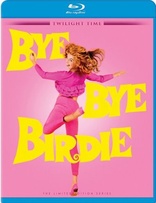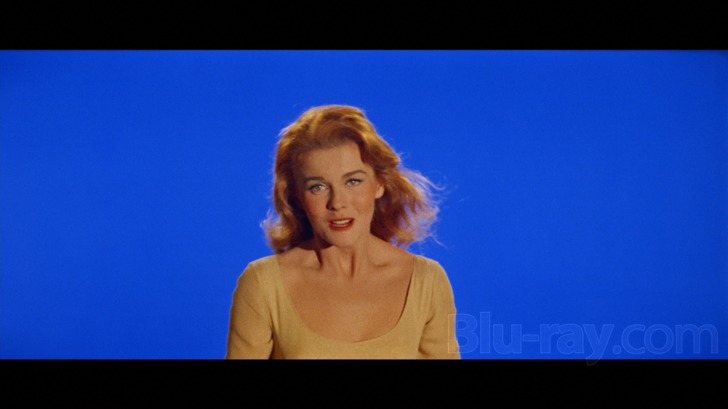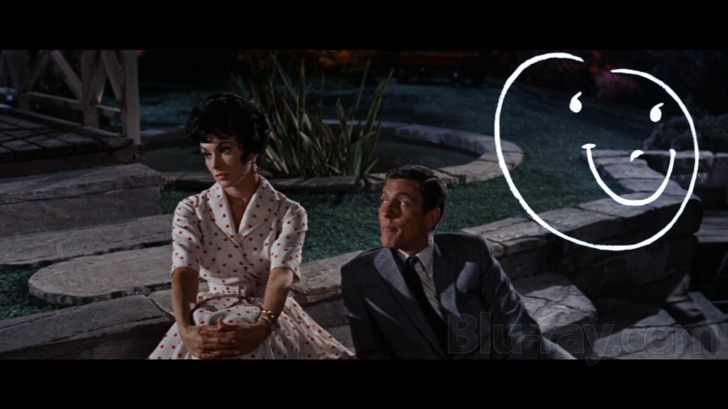Bye Bye Birdie Blu-ray Movie
HomeBye Bye Birdie Blu-ray Movie 
Limited Edition to 3000 - SOLD OUTTwilight Time | 1963 | 112 min | Rated G | Aug 14, 2012

Movie rating
7.2 | / 10 |
Blu-ray rating
| Users | 4.3 | |
| Reviewer | 4.0 | |
| Overall | 4.0 |
Overview
Bye Bye Birdie (1963)
A rock star's personal appearance turns a small town into a disaster area.
Starring: Janet Leigh, Dick Van Dyke, Ann-Margret, Maureen Stapleton, Bobby RydellDirector: George Sidney (II)
| Musical | 100% |
| Comedy | 18% |
Specifications
Video
Video codec: MPEG-4 AVC
Video resolution: 1080p
Aspect ratio: 2.35:1
Original aspect ratio: 2.35:1
Audio
English: DTS-HD Master Audio 5.1 (48kHz, 24-bit)
Music: DTS-HD Master Audio 2.0 (48kHz, 24-bit)
Subtitles
English SDH
Discs
50GB Blu-ray Disc
Single disc (1 BD)
Playback
Region free
Review
Rating summary
| Movie | 4.0 | |
| Video | 5.0 | |
| Audio | 4.0 | |
| Extras | 1.5 | |
| Overall | 4.0 |
Bye Bye Birdie Blu-ray Movie Review
Watch this 'Birdie'.
Reviewed by Jeffrey Kauffman August 12, 2012It’s common wisdom that the so-called “rock musical” was born with Hair in the late sixties and then given a major boost a year or two later with Andrew Lloyd Webber and Tim Rice’s iconic Jesus Christ Superstar, and while that may be technically true (at least insofar as the typical understanding of the rock musical idiom goes), it’s really possible to make a convincing argument that the real first rock musical was an unassuming little show that opened on Broadway in April of 1960 without much advance hype and with no huge name stars in its cast. That “little” show turned out to be one of the major blockbusters of the season, eventually taking home the Best Musical Tony Award that year and making relative newcomer Dick Van Dyke an overnight sensation (co-star Chita Rivera was already fairly well known for her turn in West Side Story as Anita, but few would have considered her an A-list leading lady in the day). Bye Bye Birdie played on the then well known news of one Elvis Presley having been drafted into the Army, serving up a deliciously wry slice of social commentary and satire that featured an absolutely infectious score by a team no one had heard of before the musical opened, composer Charles Strouse and lyricist Lee Adams. While the show’s more traditional sounding “Broadway” tunes like “Put on a Happy Face” and “A Lot of Livin’ to Do” were soon major hits being covered by any number of then popular “easy listening” artists, the show is quite notable for its prescient introduction of rock rhythms into the then pretty staid and formalized world of Broadway tunecraft. Everything from the gently swaying “One Boy” to the more raucous “The Telephone Hour” pulsated with a new kind of energy that Broadway had never really felt before, a youthful insouciance that signaled a new generation of Broadway professionals was on the scene, and that new approaches to songwriting were going to be part and parcel of this generational shift.

Many stage musicals encounter a rocky road in their transition from the Great White Way to the soundstages of Hollywood. For every admirable effort like West Side Story or The Music Man, there’s at least one corresponding disaster like A Chorus Line (which was bad enough to count for two all by its very self). Even hugely acclaimed screen adaptations like Bob Fosse’s film of Cabaret often bear little to no resemblance to their original stage incarnations. (Many who have only seen the film version of Cabaret would probably be amazed at just how different the Broadway musical actually is.) Bye Bye Birdie certainly isn’t in the same “rewrite” class as Cabaret is, but there’s no denying the property was rather radically altered for its film adaptation, and the reason for that alteration can be summed up in one word: Ann-Margret (OK, possibly two words, depending on how you feel about hyphens).
Ann-Margret’s early career had been mentored by none other than George Burns, and the singer-actress had been signed to long term contracts both by RCA Records (where she managed to score a couple of midlevel hit singles) and 20th Century Fox, which quickly cast her in the remake of State Fair, after having loaned her out to United Artists for Frank Capra’s Pocketful of Miracles. The young woman’s husky yet whispery singing voice and va-va-va-voom physical presence quickly became a sensation, and by the time Bye Bye Birdie was before the cameras, there was little doubt that the character of Kim MacAfee, the young American girl chosen at random to receive a “farewell” kiss from Conrad Birdie before his stint in the Army, had become the central focus of the film. That meant that the previous focus, the relationship between budding songwriter Albert Peterson (Van Dyke) and his secretary cum fiancée Rose (Janet Leigh), was pushed off at least partially to the figurative (and occasionally even literal) wings.
These changes as well as a few others left Dick Van Dyke feeling less than thrilled with the film, but the fact is, taken on its own merits, Bye Bye Birdie is one of the most ebullient screen musicals of its era. The film significantly opens up the stage version and it also takes advantage of the medium of film in at least a couple of key sequences, including a wonderful “jigsaw” multi-panel effect during “The Telephone Hour” and a kind of goofy, yet lovably effective, animated element in “Put on a Happy Face”. The film also wisely retained another key player from the original Broadway version along with Van Dyke, the then largely unknown Paul Lynde, who is simply hysterical as Kim’s surprisingly calm (yet rather conniving) father, Harry.
Some of the other casting is a bit more problematic. How a typically goyische man like Albert Peterson ended up with a paradigm of a Jewish mother, as portrayed by Maureen Stapleton, is anyone’s guess. Bobby Rydell, then a sort of “junior Elvis” himself, is a bit self-conscious as Kim’s erstwhile boyfriend Hugo. The strangest casting choice is Janet Leigh as Albert’s girl, Rosie. In the stage play, Rosie was an unabashed Hispanic woman (though truth be told, that was an addition to the original conception of the character, made when Rivera accepted the part after several other actresses had turned it down). Here, sporting a rather odd looking black wig and doing her best to sing and dance, Leigh seems a bit out of place. Her performance has actually grown on me through the years, and doesn’t seem quite as anachronistic as it did when I first saw the film many, many years ago, but this Rosie is definitely not the Latina firebrand of the stage version.
A lot of Bye Bye Birdie will probably leave younger viewers feeling a bit confused, even if they understand the basic outlines of the plot. Does anyone even remember the furor surrounding Elvis’ draft notice of the late fifties? Does anyone even remember Elvis? And how many people under, say, 30 (or maybe even 40—eegads!) are going to recall what a weekly institution Ed Sullivan was for countless Americans huddled around their Sunday evening television sets? But putting this temporal issues aside, the film is breezy, bright and incredibly colorful, with fizzy performances, some laugh out loud funny moments, and that infectious Strouse-Adams score. It may not play like a “rock musical” to modern audiences, but people in the early sixties had never really heard anything quite like Bye Bye Birdie before.
Bye Bye Birdie Blu-ray Movie, Video Quality 

Bye Bye Birdie is presented on Blu-ray courtesy of Twilight Time with an AVC encoded 1080p transfer in 2.35:1. This is yet another revelatory transfer from Columbia-Sony and Twilight Time. I'd say this high definition presentation looks like it was filmed yesterday, except that perhaps doesn't do it full justice—it actually looks like it's happening in real time before your very eyes. Nary a hint of damage crosses the elements, the image is remarkably sharp and clear (actually breathtaking at times), and the colors are gorgeously vivid and beautifully saturated and robust. Fine object detail is excellent, contrast and black levels are spot on, and a healthy layer of grain is readily apparent (there's no egregious grain in a couple of the opticals, notably "The Telephone Hour", which may mean some very judicious DNR was applied). All in all, simply a spectacular job by Columbia-Sony and another incredible release from Twilight Time from an image standpoint alone.
Bye Bye Birdie Blu-ray Movie, Audio Quality 

Bye Bye Birdie features a great sounding lossless DTS-HD Master Audio 5.1 mix. This may not be the most overwhelmingly immersive surround mix you've ever heard, but it presents the charming Strouse-Adams score (with sumptuous Johnny Green orchestrations and conducting) in a phenomenal setting (as is usual with these Twilight Time releases, there's also an isolated score audio option). There is some very slight boxiness to the midrange here that is most evident in the musical moments, but it may not even rise to the level of recognition, let alone annoyance, to all but the most persnickety audiophiles. Fidelity is excellent and dynamic range is varied and decently wide.
Bye Bye Birdie Blu-ray Movie, Special Features and Extras 

- Original Trailer (HD; 4:37)
- Teaser (HD; 2:34). Notice how Ann-Margret is the chief attraction in this piece.
- Isolated Score and Effects Track is presented in DTS-HD Master Audio 2.0.
Bye Bye Birdie Blu-ray Movie, Overall Score and Recommendation 

To paraphrase those oft-quoted showbiz Bible words from 42nd Street, Ann-Margret went into Bye Bye Birdie as the modern equivalent of a chorus girl and came out a star. It's easy to see why. Seldom has one young woman so effectively embodied both unabashed wholesomeness and an almost preternatural amount of absolutely smoking sex appeal. It's little wonder Bye Bye Birdie was rebuilt around the rather spectacular form of Ann-Margret. Those who love the stage version will probably carp about everything that's been changed, but the simple fact is the film is a delight on its own terms. Yes, it's definitely a relic of the early sixties, but that somehow only adds to its allure now in the early 21st century. This is an absolutely stunning transfer from a visual perspective, and the sound, while just slightly problematic (at least to this curmudgeon), is very good as well. Highly recommended.
Similar titles
Similar titles you might also like

How to Succeed in Business Without Really Trying
Limited Edition to 3000
1967

Hair
1979

Ziegfeld Follies
Warner Archive Collection
1945

Reefer Madness: The Movie Musical
2005

A Funny Thing Happened on the Way to the Forum
1966

Thoroughly Modern Millie
1967

Company
Stephen Sondheim's Company
2007

Du Barry Was a Lady
Warner Archive Collection
1943

Gypsy
Warner Archive Collection
1962

Mame
1974

Les Girls
Warner Archive Collection
1957

Damn Yankees
Warner Archive Collection
1958

Victor/Victoria: The Broadway Musical
1995

Anchors Aweigh
1945

Finian's Rainbow
Warner Archive Collection
1968

Clambake
1967

Robin and the 7 Hoods
1964

Camp
2003

Road to Bali
1952

Hello, Dolly!
Fox Studio Classics
1969
